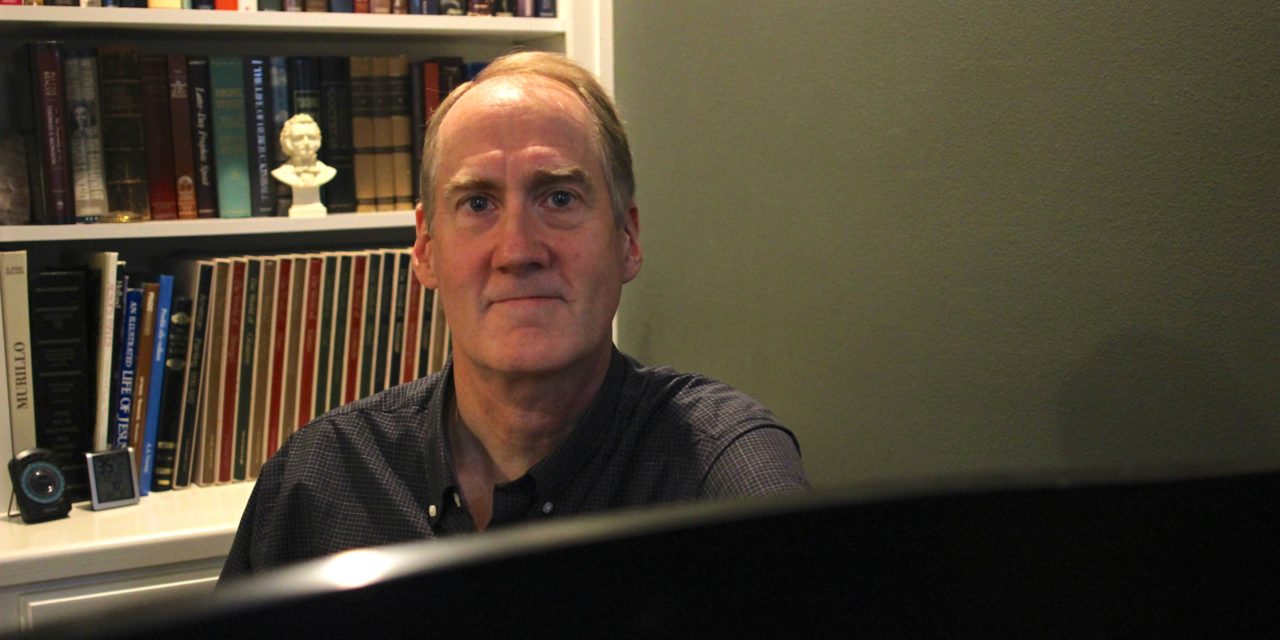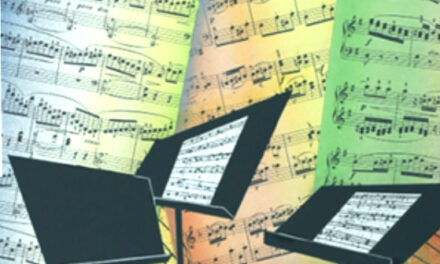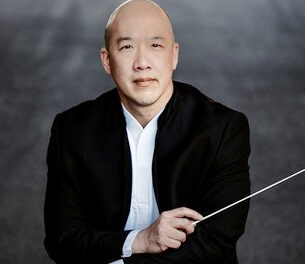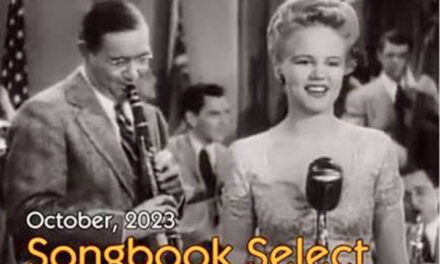(Above: Peter van de Graaff, singer and radio personality at KWAX-FM 91.1; photo by Randi Bjornstad)
Note: A version of this profile appeared first on the Radio Redux website, radioreduxusa.com, courtesy of Eugene Scene)
By Randi Bjornstad
Most people probably know Peter van de Graaff best for two reasons: 1) his singing and radio voice, which can only be described as “mellifluous” (synonyms: pleasant-sounding, sweet-sounding, mellow, dulcet, honeyed, lyrical, silvery, golden, lilting, soothing); and 2) his name, about as Dutch as it can get, with its double prefix “van de,” meaning from, followed by the further doubled letters in Graaff.
Van de Graaff has been a household name in many parts of the United States for years beyond his home area of Chicago because of his hosting of classical radio programs, most notably the Beethoven Satellite Network, which broadcasts overnight shows of classical music on more than 150 radio stations nationwide.
But the Eugene area also has claimed him as its own since he and his singer and voice teacher wife, Kathleen van de Graaff, relocated to Oregon early in 2016, when he became music director at the University of Oregon’s all-classical music station, KWAX-FM 91.1, replacing the retiring Caitriona Bolster.
More recently, he’s also become part of Fred Crafts’ Radio Redux, a performing ensemble that recreates classical radio shows from the mid-20th century in the Soreng Theater at the Hult Center for the Performing Arts.
His first appearance was a “tiny part” in The Maltese Falcon, he recalled, followed by many more forays into the Radio Redux world of reconstituting classic radio plays with the audience playing the part of the original studio audiences.
“I am a real nostalgia freak when it comes to radio, and I also love old movies,” van de Graaff said. “I think I was born in the wrong era.”
As s soon as he heard about Radio Redux, “I was hooked,” he said. “To be onstage, helping to recreate these old programs, is such a thrill. It’s amazing how great vocal actors can create a world using their voices — they can say one word and create a mood.”
In fact, van de Graaff was well aware of Radio Redux before he had even arrived in Eugene.
“I sort of ‘met’ Fred Crafts before I even got here,” he said. “When we were thinking about making the move, I did an internet search, and Radio Redux came up. I sent Fred a message and said, ‘Please put me on your mailing list,’ and he answered, ‘I will do better than that, I will put you in our group.’
“I’m amazed at what Radio Redux is able to do — the scripts, the props, the sound effects, the costumes, the right feel for the era,” van de Graaff said. “It is great to be a part of it.”
Destined for music
Despite his name, 57-year-old van de Graaff is thoroughly American, having been brought up in Glencoe, Illinois, outside Chicago. His parents weren’t particularly musical, he said, but he had a fascination with music from early childhood, to the point that as he grew up and it became obvious that music was in his permanent future, his dentist father “always encouraged me to find something else to fall back on,” van de Graaff recalled.
“I was always drawn to the piano, and I practiced voraciously as a child, and I read everything I could lay my hands on about composers,” he said. “It was something I just had to do — maybe it was my form of rebellion.”
With his boy soprano voice, he also loved singing. “I was always in the church choir, and I sang the part of Amahl (in the Christmas opera, Amahl and the Night Visitors) when I was 11,” he said.
Two siblings, too, had theatrical bents in high school, although the brother went on to become a lawyer instead. The sister, Janet, on the other hand, “was always a comedian — she was in The Second City for many years and has had a very successful career in Toronto,” van de Graaff said. “She married a Canadian who also has has much success in the theater industry.”
That Canadian is Bob Martin, who wrote the successful Broadway shows Elf and Drowsy Chaperone, the latter which was based on the couple’s relationship and in fact has main characters named for them.
After high school, Peter van de Graaff went to college at Brigham Young University — “I grew up in an LDS family, and we had some family in Utah,” he said — and while he pursued his musical talents, the choice of BYU also opened the door to his complementary vocation as a radio host.
“KBYU was a great radio station, and I got the best possible training there,” van de Graaff said. “It’s still doing well — it hasn’t changed that much, and it still trains students in broadcast and production, as it did when I was there. You don’t find that opportunity very often in most places any more.”
While in his junior year at BYU, van de Graaff met his wife to be, Kathleen, who also studied voice as well as earning a master’s degree in vocal pedagogy.
When the couple were dating, a teacher who knew them suggested that they might perform operatic intermezzi — an Italian art from that began as short, often comedic theater-and-singing performances between acts at Grand Opera productions — and the art form has become one of their favorite ways to perform together.
“We travel and perform together often,” he said.
He’s not sure how long his singing career will last, but he expects to continue doing radio — and some acting — indefinitely.
“The singing voice inevitably starts going eventually,” van de Graaff said. “After about 60, the voice changes, with loss of muscle tone and more difficulty keeping a pitch. It’s inevitable.”
In the meantime, he’s gradually become accustomed to living in Eugene after so many years in Chicago.
“The arts are wonderful here, and the weather is amazing,” he said. “We enjoy many of the activities we have been able to do here.”









